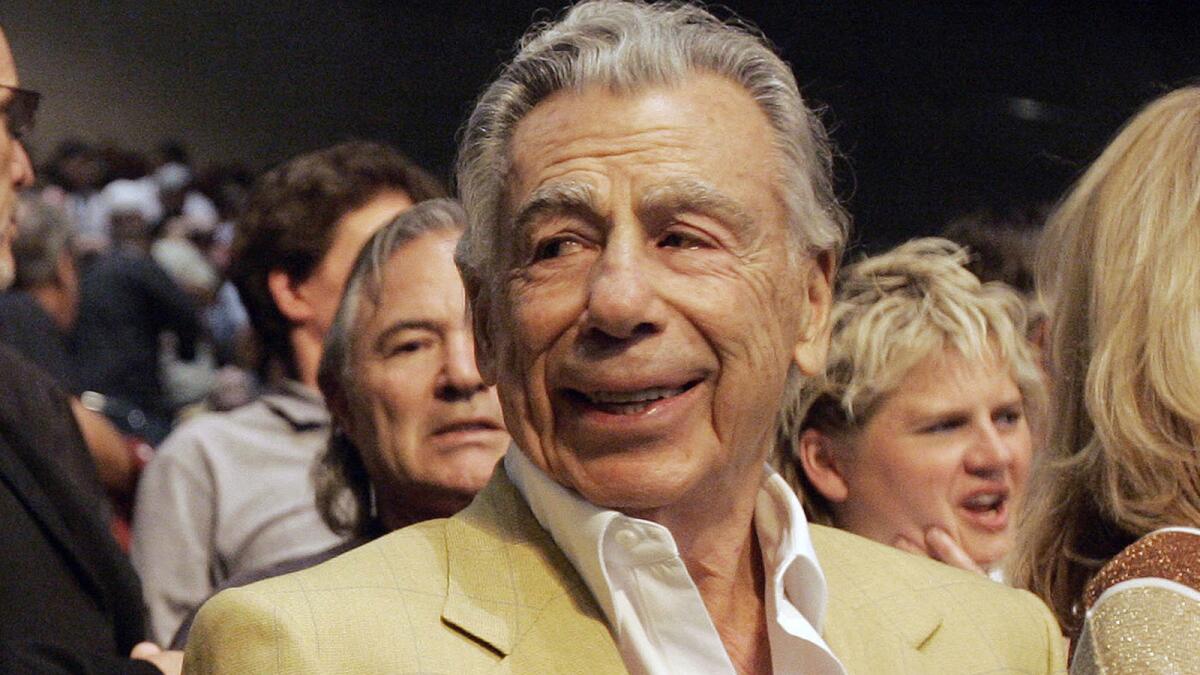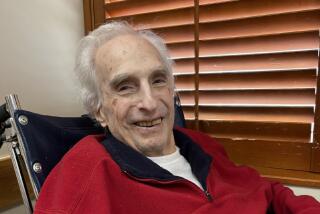Kirk Kerkorian dies: Hollywood legacy included philanthropy

Kirk Kerkorian, who died Monday night, would ultimately give away $1 billion through his philanthropic organization called the Lincy Foundation.
Kirk Kerkorian’s propensity for buying and selling assets -- including the MGM movie studio and its historic lot in Culver City -- foreshadowed today’s corporatization of the film business.
The billionaire investor, who died Monday night at his Beverly Hills home at the age of 98, also was ahead of the pack in the way that he approached philanthropy. He engineered a hugely successful career by building, and flipping, business properties.
Hollywood was no exception.
Kerkorian in 1969 gained controlling interest in the Metro-Goldwyn-Mayer studio -- the legendary operation once ruled by such film royalty as Louis B. Mayer and Irving Thalberg. That would begin Kerkorian’s 35-year on-again, off-again relationship with Hollywood.
Kerkorian added United Artists to his portfolio in 1981. Five years later, the restless investor sold MGM and UA to Ted Turner’s Turner Broadcasting System for $1.5 billion. Hollywood executives quickly recognized that it was Kerkorian who had come away with the best end of that deal.
Months later, Turner realized that he couldn’t afford the studio and sold most of the assets, including the valuable MGM logo and the UA library, with the James Bond franchise, back to Kerkorian. Turner held onto the valuable 3,000-title MGM catalog, which included such movie classics as “Gone With the Wind.” Turner desperately needed the content for his cable TV channels.
In 1990, Kerkorian sold what was left of the studio to Italian businessman Giancarlo Parretti. The deal, which fetched $1.3 billion, would turn into one of Hollywood’s biggest financial debacles.
About a year later Bank Credit Lyonnais seized control of the studio after Parretti defaulted on his loans -- liabilities that were estimated at $2.5 billion.
New management was brought in to salvage the studio’s operations. The MGM team led a creative revival, one that included such films as “The Birdcage” and “Get Shorty.”
The bank arranged an auction, and Kerkorian swooped in again. He acquired the studio for the third time in 1996, paying $1.3 billion.
Kerkorian ultimately sold the studio, then a publicly traded company, in 2004 to a consortium headed by Sony Corp. The group, which paid about $5 billion, including debt, was interested in the James Bond film franchise.
At that time, the Los Angeles Times calculated that Kerkorian could have made as much as $3.5 billion from the deal. (In 2010, MGM filed for Chapter 11 bankruptcy protection.)
Kerkorian could be polarizing, and many in Hollywood treated him dismissively. They blamed him for gutting MGM and treating it like just another commodity business with widgets or parts that could be bought and sold.
But those who worked with him said Kerkorian was one of the most generous people they had ever met.
“He was the type of person who would have a $10 meal and give the waiter a $100 tip,” said Jay Rakow, a former MGM legal executive who ran Kerkorian’s philanthropic organization, the Lincy Foundation, for many years.
“He never forgot where he came from, and he was incredibly generous,” said Rakow, who now serves as chief executive of ProCon.org, a nonprofit educational and information site.
“He quietly gave away $1 billion long before other billionaires decided to also give money currently instead of keeping an endowment,” Rakow said. Now that practice is more common.
The Lincy Foundation was launched in 1989 after the devastating Armenian earthquake to help victims of the disaster. (The foundation, like Kerkorian’s investment company, Tracinda Corp., was named after his two daughters, Linda and Tracy.)
Over the years, the foundation made donations that totaled $1 billion, including more than $200 million to UCLA. It stepped up its donations during and after the 2008 recession, Rakow said.
That’s when Lincy Foundation executives cold-called the Feeding America nonprofit, and ultimately contributed tens of millions of dollars. The money went to food banks and homeless shelters around the country, Rakow said.
The foundation also gave to inner-city schools, including in Watts in Los Angeles, and poor communities in Las Vegas. It funded social services programs and shelters for battered women, Rakow said.
“The contributions were always done in a way to help people who were most in need,” Rakow said. “He wanted to make a difference in people’s lives.”
The foundation was dissolved in 2012, after all the money was dispersed.
The magnate who helped build modern-day Las Vegas didn’t want to hold his winning hand for too long. But he sure knew how to play his cards.
Seven years into his final stewardship of MGM, Kerkorian engineered a splashy bid of more than $11 billion for the Universal film and TV studio, which was then owned by the French company Vivendi. General Electric would ultimately prevail, creating today’s NBCUniversal.
But Kerkorian’s bidding strategy worked beautifully.
Investors placed a much higher value on movie studios -- and their libraries. His gambit came amid a huge boom in DVD sales, which drove up value of Hollywood studios that had large film libraries.
Within a year, MGM itself was being pursued as an acquisition target.
“Working at MGM Studios when he owned it was like getting an MBA without paying the tuition,” Janet Janjigian, executive managing director of the Carmen Group West and a former MGM executive, said about Kerkorian on Tuesday.
“He uniquely knew the value of the MGM library and the need to protect it while promoting new film production as well -- very strategic insight for Hollywood,” Janjigian said. “He was a force in the entertainment industry.”
Twitter: @MegJamesLAT
More to Read
From the Oscars to the Emmys.
Get the Envelope newsletter for exclusive awards season coverage, behind-the-scenes stories from the Envelope podcast and columnist Glenn Whipp’s must-read analysis.
You may occasionally receive promotional content from the Los Angeles Times.







